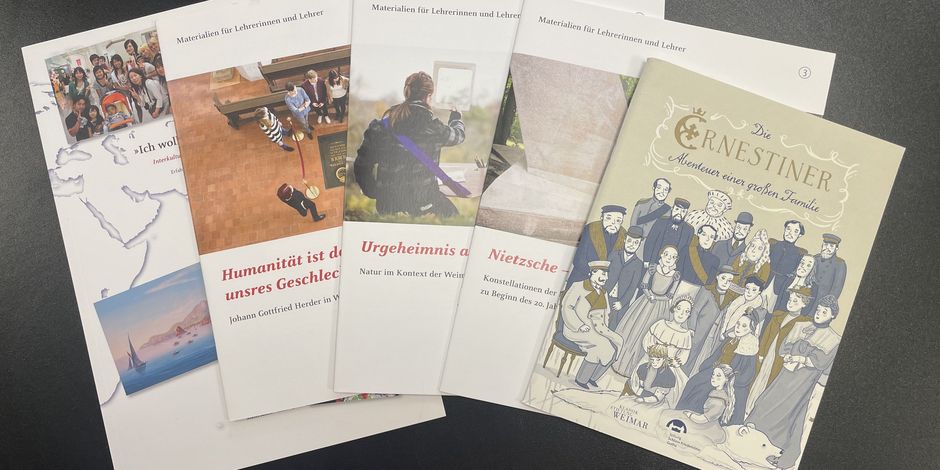Projects of the Klassik Stiftung Weimar are funded by the European Regional Development Fund (ERDF) and the Free State of Thuringia, represented by the State Chancellery of Thuringia, Department of Culture and the Arts.

Theme-based booklets
In the following you will find a variety of booklets and brochures – from Excursion bookletsto comic books – which can be used to prepare for and follow up your visit to Weimar.
Excursion booklets
Our excursion booklets are especially targeted at teachers, students and cultural tourists. In addition to providing general information, they offer suggestions on historical sites and landmarks worth visiting during your stay in Weimar. The excursion booklets are free of charge and can be ordered online at bildung@klassik-stiftung.de.
Seeking the Land of the Greeks with the Soul. Reception of Antiquity in the Context of Weimar Classicism
The intensive interest in antiquity that manifested itself in many forms in the 18th century is still evident in Weimar today in its buildings, artworks and, not least of all, literature. The suggested excursions in this booklet highlight such themes as Goethe’s and Duchess Anna Amalia’s Italian journey, the reception of antiquity, and how ancient art history influenced the understanding of art in Weimar.
“Reception of Antiquity in the Context of Weimar Classicism” (in German only)
Allies, Companions, Kindred Souls. Friendships in the Context of Weimar Classicism
Numerous friendships formed the foundation for the development of Weimar Classicism. Specific references to places, objects and literary sources vividly portray the friendships between Goethe and Schiller, Duchess Anna Amalia and Louise von Göchhausen, and Christian Martin Wieland and Sophie Brentano.
“Friendship in the Context of Weimar Classicism” (in German only).
Nietzsche – Van de Velde – Bauhaus. Constellations of Modernism in Weimar at the Beginning of the 20th Century
The ambivalent developments of modernism in German culture were clearly visible in Weimar at the turn of the 20th century. This booklet offers suggestions for excursions that highlight the aesthetic innovations of that time and Germany’s strong orientation to established cultural traditions. The emergence of holistic lifestyles and aesthetic forms of expression played a central role in these developments.
“Constellations of Modernism in Weimar at the Beginning of the 20th Century” (in German only).
The Primal Secret of All Creation. Nature in the Context of Weimar Classicism
Societal and intellectual shifts sparked a wave of philosophical contemplation on nature around 1800. This newfound appreciation of nature became an important subject in art and science and influenced the image of humankind of that time. The excursion booklet provides specific examples of objects at various sites which illustrate these themes.
“Nature in the Context of Weimar Classicism” (in German only).
Humanity is the Character of Our Race. Johann Gottfried Herder in Weimar
Johann Gottfried Herder often complained about his many duties in Weimar, yet he was one of the most versatile, innovative and prolific philosophers and writers around 1800. Throughout his life, Martin Luther had been his constant paragon and role model. The suggestions for excursions will take you to places where Herder’s ideas and references to Luther are visible today.
“Johann Gottfried Herder in Weimar” (in German only).
The Ernestines. Adventures of a Grand Family
The comic book “The Ernestines. Adventures of a Grand Family” was developed as part of the Thuringian state exhibition entitled “The Ernestines. A Dynasty Shapes Europe” (24 April – 28 August 2016). Six exciting, touching and humorous episodes offer insights into the eventful 400-year history of the great and influential members of the Ernestine dynasty.
The package includes a handout with numerous tips and ideas for use in school.
To order, please visit: bildung@klassik-stiftung.de
Price: free
Download materials here:
Intercultural Dialogue of Yesterday and Today - “I simply wanted to leave”
Interculturality was a topic of discourse around 1800, and it is possibly more relevant today than ever before. The material provides numerous suggestions and ideas for productive discussions about foreign and familiar subjects of the past and present.
You can download the theme-based brochure here:
Download cover (german only)
Download brochure (german only)
The Goethe- und Schiller-Archiv. A Treasure Trove of German Literature
This booklet provides insights into the most important holdings and the most famous and beautiful manuscripts in the archive.
You can download the booklet here. (german only)
Discover Cranach in Thuringia. Eisenach - Gotha - Weimar
This brochure helps you prepare for and carry out a Cranach-themed excursion. It invites the participants to discover the era of the Reformation, the emergence of a common German orthography, and the spread of new pictorial ideas.
You can download the brochure here. (german only)

